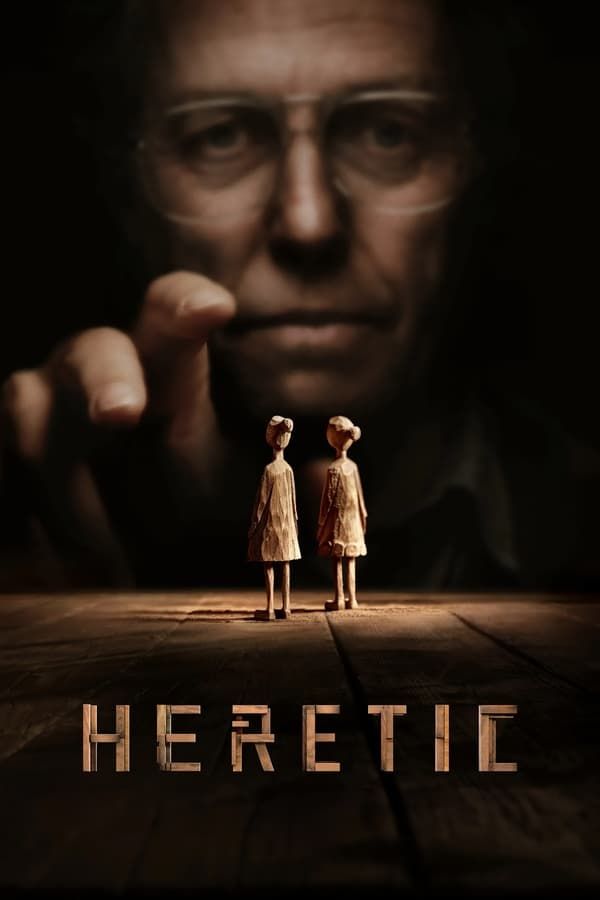Audiences who go see Heretic might be curious as to why the A24 horror film includes a disclaimer in the end credits that reads, “No generative AI was used in the making of this film.” Directors Scott Beck and Bryan Woods had a very specific reason for including that note in their latest thriller.
Best known for writing A Quiet Place, Beck and Woods previously directed Haunt and the Adam Driver dinosaur thriller 65. Their new movie stars Sophie Thatcher and Chloe East as two Mormon missionaries who enter the home of Mr. Reed, played by Hugh Grant, and shortly find out that he has sinister intentions.
Despite Heretic having a rather small scope, the movie is being released at a time when the discussion around using generative AI in film has become more common place in response to studios pushing for the technology. Beck and Woods told Variety why they opted for Heretic to include a disclaimer letting the audience know the movie didn’t feature any AI-generated images:
“We have no illusions that when people watch
Heretic
they’re going to go, ‘Wait, did they use generative AI?’”
Woods told
Variety
.
“It doesn’t feel like that at all, but it was important for us to put that out there because we think it’s something people need to start talking about.”
Woods didn’t hold back on his feelings for AI, calling it “an algorithm jumbling a bunch of s–t together and then spitting it out as art. It’s not human, and it’s borderline theft on some level.” While acknowledging the technology is impressive in isolation, he does not want to see any more of it. Woods said, “AI is an amazing technology. Beautiful things will come of it, and it’s jaw-dropping. What is being created with generative AI and video … it’s amazing we could create that technology. Now let’s bury it underground with nuclear warheads, cause it might kill us all.”
With regard to the wider industry trends, Woods was open about how industry decisions to back AI are motivated by financial incentives, not artistic ones. Woods said:
“I think this idea that an algorithm can just scrape all of human history and art off the internet, repackage it, regurgitate it, spit it out and somebody else can use that to create profit … I don’t know why that’s legal. It’s important for people to start talking about the need for human intersection in art, business and every facet of this life, because we’re on the precipice of every job on planet Earth being replaced overnight. It’s going to happen so fast. And it’s easy for it to happen in the arts. We’re in a business that is exceptionally greedy. Decisions are made for the bottom line and not for the good of the artistic process.”
When it came time to put the title card up, A24 seemed to be on board. This is something that Beck commented on while speaking about the dangers of AI moving forward in the film industry:
“As far as we’re aware, they’re absolutely fine with it. They’re a studio that is incredibly artist-friendly in the best sense possible. They’re a home where you feel like you’re working with human beings, you’re not working with algorithms, or ‘How does the test score dictate the rollout of a movie?’ That human touch that they have we absolutely respect, and we are in a time where I feel like creatively we’re in one of the big ethical battles, and the race is already ahead of us. The importance is to have these conversations before they force things in, just because it makes sense from a corporate structure. It’s incredibly dangerous. If there’s not people to throttle it, we’re going to find ourselves in five to ten years in a very dangerous situation.”
2024 Has Been a Troubling Year for Studios Embracing AI
A24 backing Beck and Woods’ decision to include an AI disclaimer is admirable, but it also feels a bit like damage control as the studio faced controversy earlier this year when it released a series of generative AI posters for the film Civil War. 2024 has been filled with terrible stories about AI becoming more commonplace in the industry. The critically acclaimed Late Night with the Devil had its reputation soured by the use of generative AI artwork in the film. Horror studio Blumhouse announced a controversial decision to partner with Meta and make AI-generated films. Disney is also getting in on the AI business, although it is unclear what will happen now that Marvel’s future Doctor Doom, Robert Downey Jr., has vocally opposed AI recreations of his image.
Related
2024’s Acclaimed Horror Movie Heretic Gets Surprising Sequel Tease
The writers behind one of A24’s most anticipated releases already have their eyes set on the future.
Real public fears about AI have led to unintended consequences: filmmakers who don’t use the technology are being accused of using it due to its perceived prevalence. A24’s The Legend of Ochi was accused of using AI to create its title character, and the film’s director, Isaiah Saxon, had to clarify that no AI was used in the movie. Despite being a central point in the WGA and SAG-AFTRA strikes of 2023, generative AI is a dangerous and troubling technology that the studios are pushing forward as a way to save money. Heretic might not be the biggest movie released in 2024, but its commitment to informing the audience that its filmmakers didn’t use generative AI is an important time capsule for this moment that also draws attention to the many talented artists who did work to bring the A24 thriller to life.



